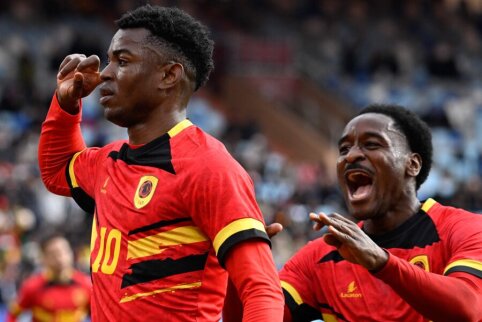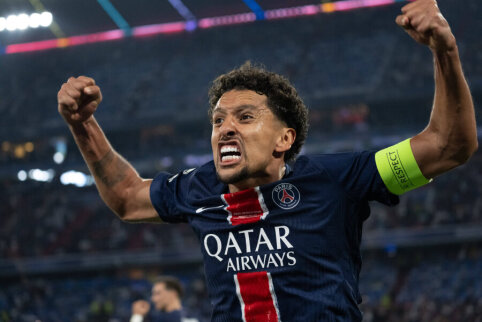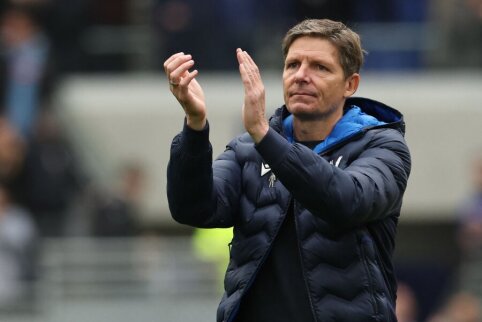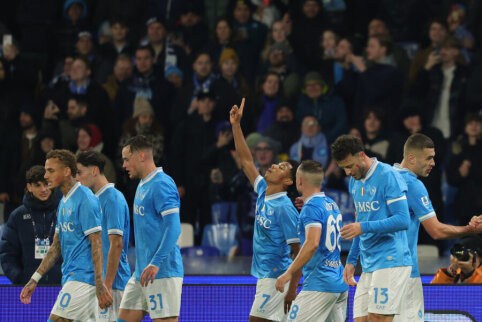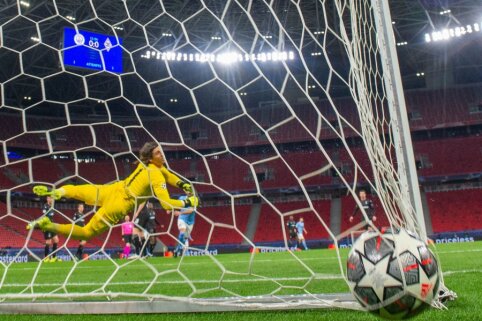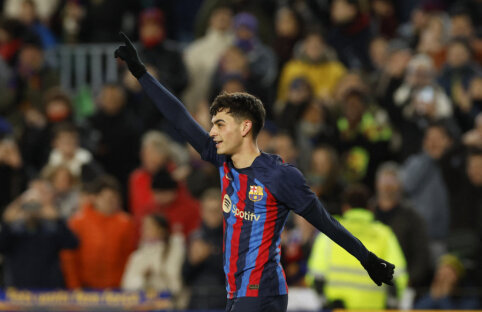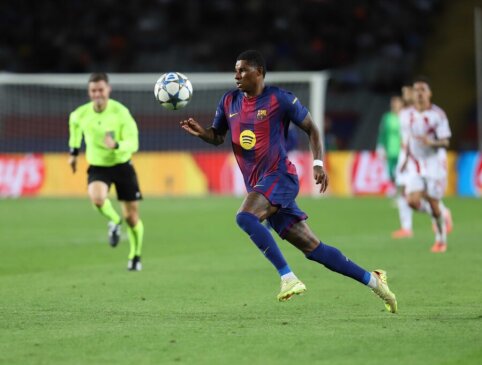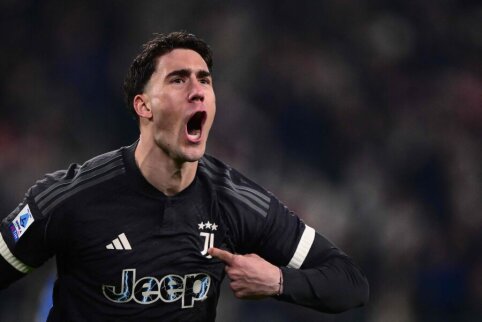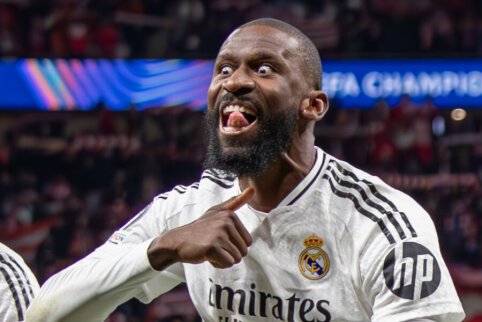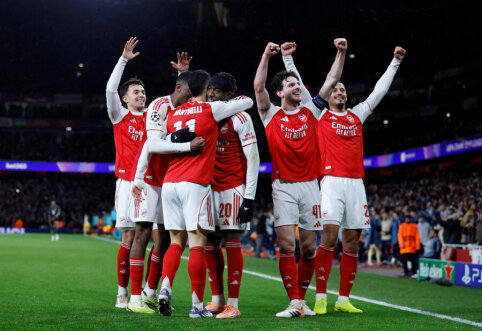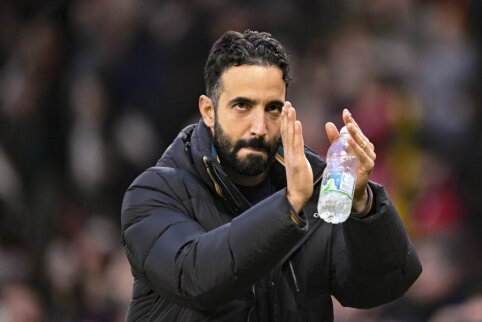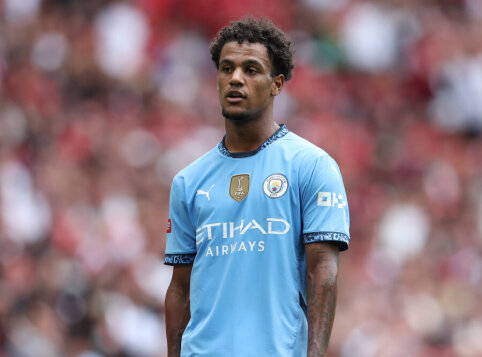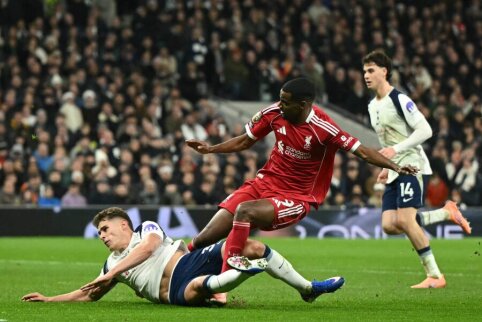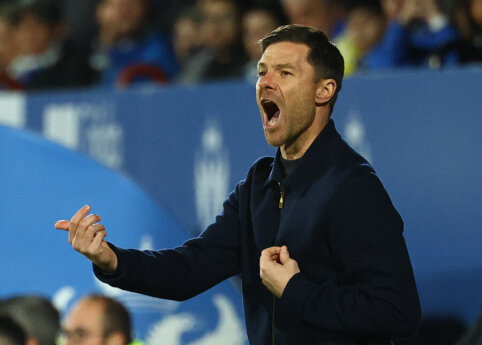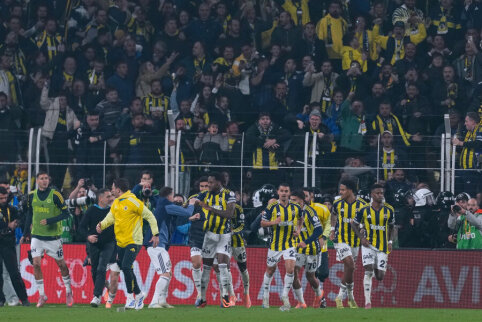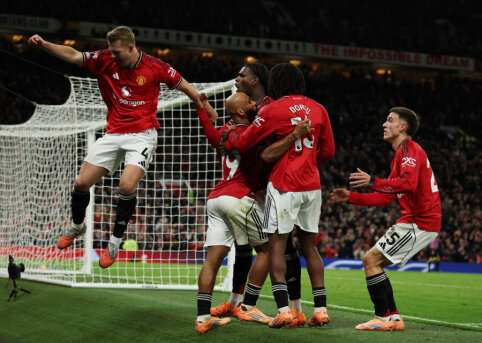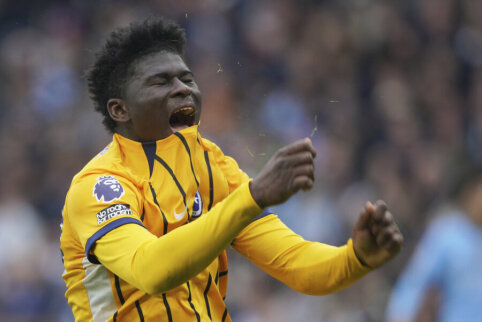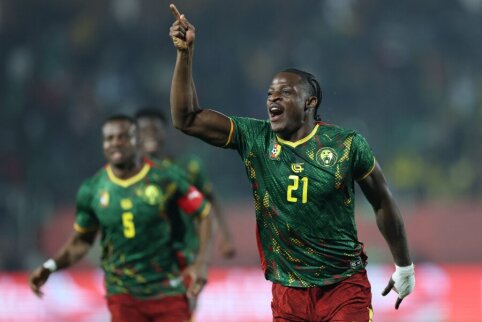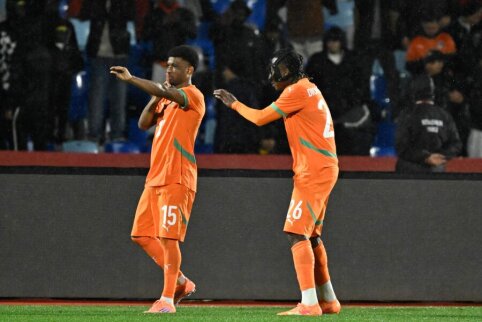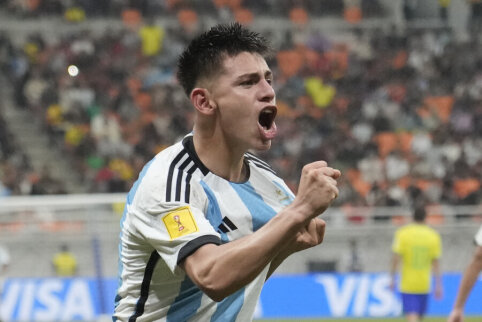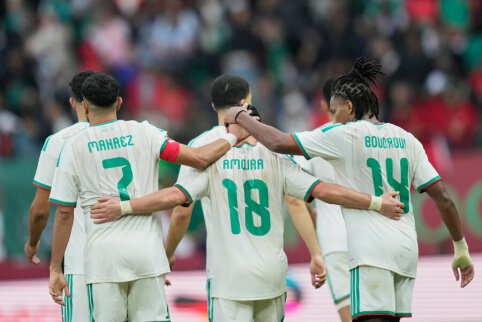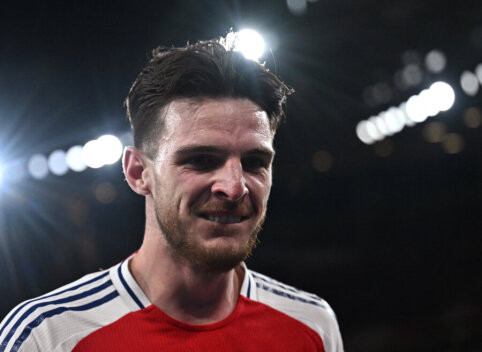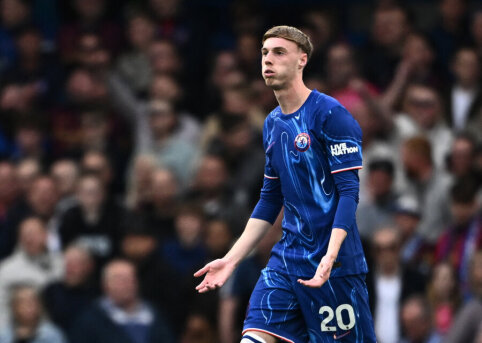 © EuroFootball.com
© EuroFootball.com
Four European teams are left to fight for the title of the strongest in the World Cup. In the first semi-final, two of the most successful teams from the Old Continent, who have previously triumphed in the tournament three times after competing in the World Cup, possessing many old scores will face off - this year's championship host Germany and Italy, which returned to the world elite after a long break.
Semifinal
Germany - Italy Time: 10 p.m. (Lithuanian time) Venue: Dortmund's Signal Iduna Park (65,000 seats) Referee: Benito Archundia (Mexico)
Quarterfinal Games
Germany 1 – 1 Argentina (Penalty shootout 4-2)
Although the match did not fulfill the expectations of beautiful football enthusiasts, there was no shortage of action and intrigue in this match. Argentina, who had previously shown the most impressive performance in the tournament, gained the advantage after Roberto Ayala's header, but Germany, increasingly gaining momentum in the tournament, did not shy away from their opponents and, with great effort, leveled the score.
In extra time, neither team managed to score, but in the penalty shootout supported by their German fans, they proved that their nerves were "colder" and confidently took the path to the semifinals, with the help of goalkeeper Jens Lehmann. However, the nerves of some players did not hold up in the dramatic match, and at the end of the match, representatives of both teams engaged in a brawl, as a result of which the German defender Torsten Frings will have to miss the semifinal match.
Italy 3 – 0 Ukraine
In the quarterfinal, Italy faced a lighter opponent - Ukraine, debuting in the World Cup, but the final result did not reflect the events on the field. Although Marcello Lippi's proteges started the match confidently and took the lead after a precise shot by Gianluca Zambrotta and controlled the game, after the break, the initiative was taken by the Ukrainians who managed to break through the Italian defense several times and were very close to equalizing, but luck was on Italy's side.
However, the favorites of the match demonstrated their mastery and punished Ukraine twice for missed opportunities. Interestingly, the latter, previously associated with the 1982 Italy led to the top with his six goals in the tournament, the attacking leader of the "Squadra Azzurra," Paolo Rossi, like his predecessor, failed to score in the first four tournament matches.
Previous matchups
Italy and Germany have met 28 times - Italians won 13, and Germans 7 times. Six official meetings between them all took place in final tournaments, and Italy has not lost any - they won two and played four times to a draw. In the last four meetings in the World Cups, Italy won twice and tied twice.
The teams met once in the World Cup semifinal, and then, in 1970, the match was unmatched and one of the most impressive in the tournament's history - after extra time, the Italians defeated the Germans 4-3 and reached the final, where they lost to Brazil led by Pele. In the 1982 final, the Germans had a chance to take revenge, but Italy was once again stronger and defeated their opponents 3-1, winning the World Cup gold for the third time in history.
The last match between the teams in a friendly match in Florence ended with Germany's crushing victory with a score of 4-1. Alberto Gilardino, Luca Toni, Daniele De Rossi, and Alessandro Del Piero scored goals for the Italians, while Robert Huth scored a consolation goal for the visitors at the end of the match.
Statistics and facts
Germany: participated in the World Cup 16 times and reached seven finals, winning three of them (1954, 1974, and 1990).
The Germans have already won seven out of the last nine matches and could become the first country to reach eight World Cup finals.
The hosts won six out of 17 World Cups. Germany hosted in 1974 and defeated the Netherlands in the final. When playing in Dortmund, Germany won 13 international matches and played to a draw once, in 1977 against Wales. During these matches, the Germans scored 59 goals and conceded only seven.
Lukas Podolski, David Odonkor, and Arne Friedrich received yellow cards in the match against Italy. In the event of their team's victory, they should miss the final.
Miroslav Klose, who scored five goals, is now the tournament's leading scorer. Klose has already scored 10 goals at the World Cup, making him one of the 12 players in the tournament's history to score in double-digit goals. Gerd Muller (14), Jurgen Klinsmann (11), and Helmut Rahn (10) are other Germans on the list. Half of the goals in the 2006 World Cup was scored by Klose after passes from Michael Ballack.
Italy: won three World Cups (1934, 1938, and 1982) and one European Championship (1968). The team has not experienced defeat in 23 consecutive international matches since 1939.
Italy reached the World Cup finals every twelve years since 1970: in 1970 they lost, triumphed in 1982, and had to concede to their opponents after a penalty shootout in 1994. The Italians have failed in all three of their penalty shootout encounters, while the Germans have won all four in which they participated.
Eight different Italian players scored nine goals at the World Cup. The team conceded only one goal, which was Cristian Zaccardo's own goal in a group match against the USA.
Daniele De Rossi's semifinal will be his last match, which he will have to miss due to disqualification. If his team reaches the final, he could play. Marco Materazzi, who received a red card in the match against Australia, returns after disqualification.
Alberto Gilardino will celebrate his 24th birthday the day after the match.
Thoughts before the match
Italy's coach Marcello Lippi stated that he does not expect Germany's team to weaken despite the absence of Torsten Frings due to his disqualification for a strike against Argentine Julio Cruz after the quarterfinal match. He also did not worry about the fact that the Germans have never lost at Dortmund stadium, and that the favorites, Germany, will have the support of 60 thousand fans.
"I think in the semifinals, teams have enough skill and organization to withstand the loss of a player. In this tournament, we also had to cope without several players. Frings is a crucial player, but I don't think it will affect Germany's game or their mood," said M. Lippi.
"Germany and we each have a 50 percent chance to advance. Whatever the outcome of the match, it will still be a success, but I have a good feeling. We are a strong team, and on the field, we will show all our strengths, such as the value of our players, determination, endurance, and the desire to win. Germany has a successful history in this stadium, but I have won here twice with Juventus, so I hope this will be a third time. Anything can happen. Fans? It doesn't matter. I have experienced players who have played many away matches. Nevertheless, we will not feel alone - we will play our game knowing that millions of Italians are watching us at home," said the coach confidently.
Italy's attacking leader Luca Toni identified his opponent Miroslav Klose, from the German team's attack, as the main threat to his team: "Klose has proven how good he is as a striker - not only here but also in previous tournaments. I think our defenders will have to cover him very carefully because if given the opportunity, he can punish you. He has scored so many goals and is strong physically and mentally. In some matches, he can remain unnoticed for a long part of the game but suddenly send the ball into the goal, as happened in the match against Argentina."
"This is the World Cup semifinals. If Germany has reached the strongest quartet, it is probably not for nothing. They are hard to beat, and they have the advantage of playing at home. To defeat them, we will have to play the best we can. We know what to expect and what we have to do," said L. Toni, confident in his abilities and not underestimating his opponents.
Meanwhile, Germany's coach Jurgen Klinsmann drew inspiration from history and expressed hope that playing at Dortmund's Westfalenstadione (which has since been renamed Signal Iduna Park) can give them an advantage - in this arena, the Germans have won 13 out of 14 matches and have an impressive goal difference of 59-7: "It's good to know that we will play there. There is no atmosphere like in Dortmund. It's like a volcano that I hope will erupt."
The lowest point in J. Klinsmann's career coaching the Germany team was the defeat to Italy by a score of 4-1 in May, but since then, the coach, heavily criticized, managed to surprise everyone and lead the team to the semifinals. According to the team's defender Christoph Metzelder, the team does not think about that meeting and instead focuses on the fight for a place in the final.
"Our motivation is not to avenge that defeat but to win the match. If we succeed, we will reach the most crucial football match, which is the World Cup final. That is the goal we always set for ourselves. Italians could gain additional motivation from all the scandals happening in their country. So far, they have played very convincingly. They use a solid defensive line and counter-attack well. Italy is a very high-level opponent. We will send an attacking formation onto the field and try to disturb them," said C. Metzelder.
Meanwhile, the assistant coach of the team, Joachim Low, talked about the team's goal and warned that the corruption scandal in Italy could have a positive effect on their opponents "We are completely focused on winning the match. If we succeed, we will enter the most important football match, which is the World Cup final. That is a goal we always set for ourselves. Because of all the scandals happening in Italy, they may gain additional motivation. So far, they have played very convincingly. They use a solid defensive line and counter-attack well. Italy is a very high-level opponent," said J. Low.
Losses and Strategy
Germany: Defender Torsten Frings will have to miss the semi-final match due to disqualification for striking Argentine Julio Cruz during the quarterfinal match. Good news for the Germans is that captain Michael Ballack and top scorer Miroslav Klose have recovered from minor injuries and will take to the field.
Due to Frings's absence, J. Klinsmann will not be able to choose the same lineup in five of the six matches. However, the successful performances of Oliver Neuville, Tim Borowski, and David Odonkor coming from the bench mean that the German coach will have options. He will have to decide whether to allow the more attacking Tim Borowski to replace Frings, or the more defensive Sebastian Kehl.
Italy: Like the disqualified Daniele De Rossi, Alessandro Nesta, who missed two knockout matches due to a groin injury, did not fully recover and, having played only 10 minutes in a mutual match, will not be able to train in preparation for the match against Germany. Meanwhile, Mauro Camoranesi, who missed several training sessions due to a knee injury, has returned to full fitness after the quarterfinal match against Ukraine.
Since A. Nesta still cannot play, his place in the central defense next to Fabio Cannavaro should be taken by Marco Materazzi after his disqualification. The two goals by Luca Toni against Ukraine allowed him to keep his place in the starting lineup, but M. Lippi still has to decide whether to allow his attacking partner Alberto Gilardino onto the field or, more likely, continue the strategy of the previous match, sacrificing one forward position for a safe line with M. Camoranesi on the flank, while the creative Francesco Totti was pushed further forward and played behind L. Toni.
Predicted Starting Lineups:
Germany (4-4-2):
Jens Lehmann; Arne Friedrich, Christoph Metzelder, Per Mertesacker, Philipp Lahm; Bernd Schneider, Tim Borowski, Michael Ballack, Bastian Schweinsteiger; Lukas Podolski, Miroslav Klose
Italy (4-4-1-1):
Gianluigi Buffon; Gianluca Zambrotta, Marco Materazzi, Fabio Cannavaro, Fabio Grosso; Simone Perrotta, Andrea Pirlo, Gennaro Gattuso, Mauro Camoranesi; Francesco Totti; Luca Toni
